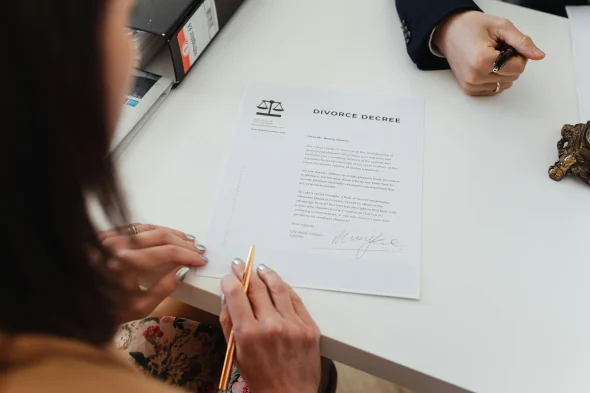How can I start the divorce process in Georgia?

Kellyn Kidwell
Georgia managing attorney at Marble Law

Key Takeaways
- Consulting an attorney can help you understand the specific legal requirements for filing for divorce in your jurisdiction, ensuring you meet all criteria and follow the correct procedure.
- An attorney can explain your entitlements in the divorce, including property division, alimony, child custody, and child support, based on Georgia law.
- Early consultation with an attorney can help identify potential roadblocks in your divorce, such as disputes over assets or custody, and enable you to address these challenges proactively.
To start the divorce process in Georgia, it is highly recommended that you schedule a consultation with an experienced family law attorney. This meeting is crucial as it will help you understand the legal requirements involved in your case and provide a clear roadmap for how to proceed. During your consultation, you will have the opportunity to address several important issues, including the specific requirements for starting a divorce in your jurisdiction, what you may be entitled to as part of the divorce, potential obstacles that could delay the process, and how to develop a strategy that will help save you time, money, and energy.

Get the right lawyer for your divorce
Schedule a free 15-min call with our team today
Determine the Requirements of Your Jurisdiction
The first benefit of consulting with an attorney is understanding the specific legal requirements of the jurisdiction in which you are filing for divorce. In Georgia, divorce laws can vary slightly depending on the county where your case is being processed. An attorney will help ensure you meet all the legal criteria, such as Georgia's residency requirements for divorce, which state that either you or your spouse must have lived in the state for at least six months before filing. Additionally, an attorney can explain the procedural steps, such as how to file your divorce petition, the necessary forms, how to serve divorce papers on your spouse, and what to expect during hearings or court proceedings. Understanding these requirements will help you avoid unnecessary delays and ensure that the process moves forward smoothly.
Learn What You May Be Entitled to as Part of the Divorce
Another important reason to consult with a divorce attorney is to understand what you may be entitled to in the divorce. Georgia law addresses several key issues during divorce, such as the division of marital property, alimony, child custody, and child support. An attorney can explain how these issues will be handled under Georgia law and help you understand your rights and entitlements. For example, Georgia follows the principle of equitable distribution, meaning that marital property will be divided fairly, though not necessarily equally. An attorney will work with you to help identify which assets and debts are considered marital property and advise you on how they might be divided.
If you have children, the attorney can also help you understand what to expect in terms of child custody and child support. Additionally, if spousal support (alimony) is a consideration, your attorney will review your circumstances to determine if you may be entitled to such support. They can provide guidance on how the court typically evaluates alimony claims, taking into account factors such as the length of the marriage, the financial needs of both spouses, and each spouse's ability to support themselves.
Identify and Discuss Potential Roadblocks
Divorce can be a complex and emotionally charged process, and there may be potential roadblocks that could delay or complicate the resolution of your case. A consultation with an attorney allows you to identify these potential issues early on. Your attorney can help you anticipate and address challenges that may arise, such as disputes over property division, disagreements over child custody, or difficulties with spousal support. For example, if your spouse is uncooperative or if there are concerns about hidden assets, an attorney can advise you on how to address these matters. Similarly, if child custody is a point of contention, your attorney can explain the steps involved in negotiating custody arrangements or pursuing litigation if necessary. Addressing these roadblocks proactively can help ensure that your divorce proceeds as smoothly as possible and avoid unnecessary delays.
Develop a Strategy to Save Time, Money, and Energy
Finally, a consultation with an attorney is key to developing a strategy that will save you time, money, and emotional energy throughout the divorce process. Your attorney can help you set realistic expectations, determine how long the process is likely to take, and guide you on the most cost-effective way to proceed. If settlement or mediation is an option, your attorney will help you explore these alternatives to avoid the expense and time commitment of a trial. Conversely, if litigation is necessary, they can prepare you for what to expect in court. By working with an attorney, you can avoid common pitfalls and costly mistakes that can arise when navigating the divorce process on your own.
In conclusion, scheduling a consultation with an attorney at the start of your divorce case in Georgia is an important step in ensuring that you fully understand the process and are prepared for what lies ahead. An experienced attorney will help you determine the requirements of your jurisdiction, identify what you may be entitled to, address potential roadblocks, and develop an effective strategy to save you time, money, and energy.
Quality legal care for life’s ups and downs
Our services
Client support








